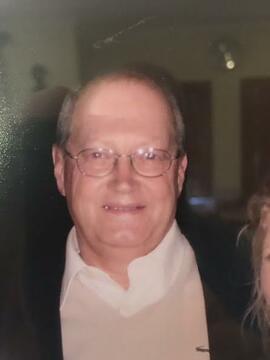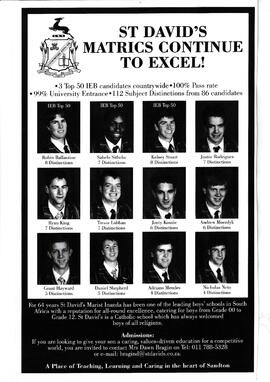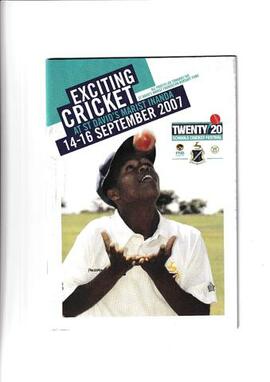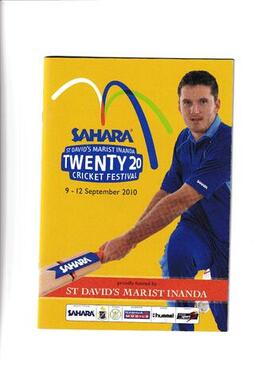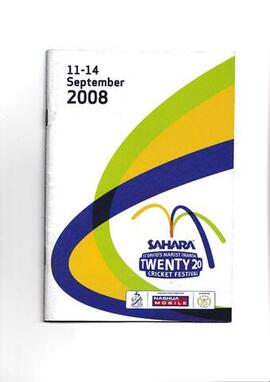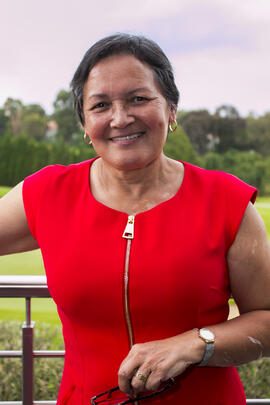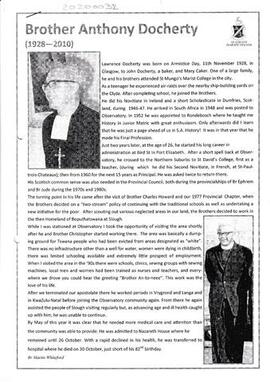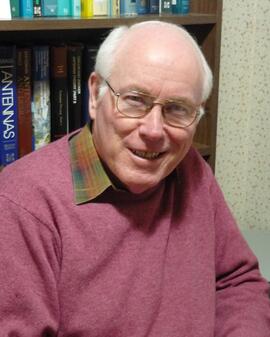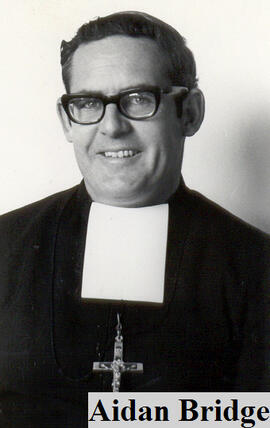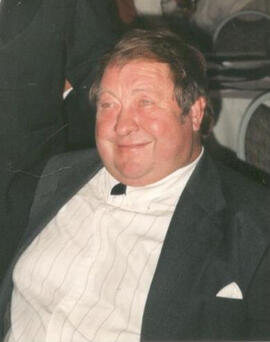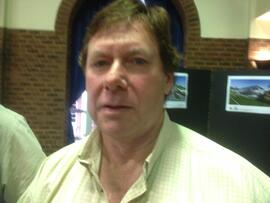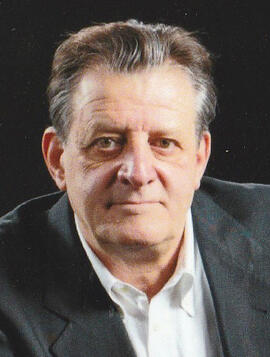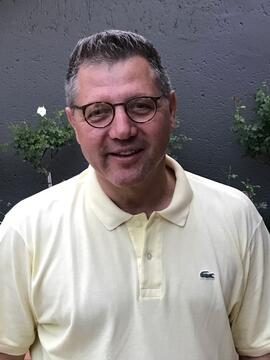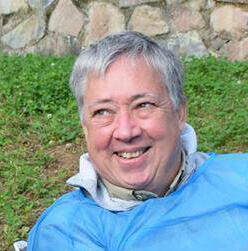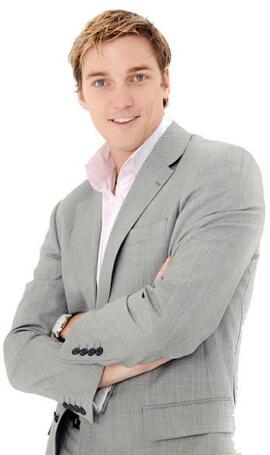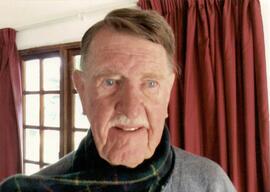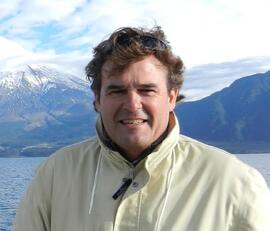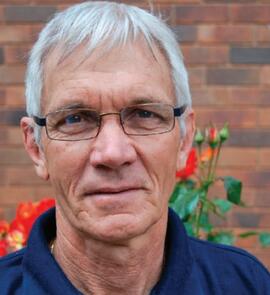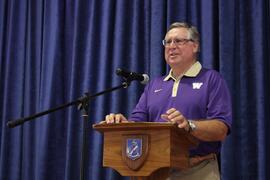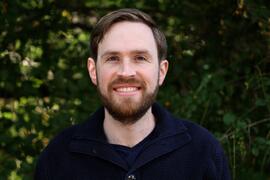Interview with Brian Austin - 1962
St David’s Inanda: some recollections before the Beatles
Brian Austin (1958 – 1962)
In those days it wasn’t called St David’s, though his name was there in the small print.
We all knew it as ‘Inanda’, to distinguish it from ‘Obs’: those other guys who wore the
same funny stripey blazer. But many people around Joburg called both schools ‘Maritz’,
for obviously South African reasons but clearly without much appreciation of who these
Marist Brothers were. And, to distinguish us from them at Obs, ‘Inanda’ was always
regarded as the posh school where you went if you didn’t sound (or want to sound) like
Al Debbo (now there’s a name from the dark ages!).
I went to ‘Inanda’ (I’ll stick with that name) in 1958. My prep school years were spent at
the little Catholic school in Maryvale, St Paul’s Parochial School, that’d been founded by
the remarkable Fr Philip Erasme OMI in 1943. I’d been head boy there but was small fry
when I arrived at Inanda. Most of the guys in standard 6 had been together at the junior
school of Inanda and so they all knew each other and also who was king. New blokes
from other places – and there were a handful of us – had to slot into the established
social order. And Inanda had boarders and the boarders were the really important guys,
not day boys who still lived with their mothers. I was a day boy.
There was only one lay teacher in the whole senior school at that time. He was Mr
Bishop and he taught us English. Mr Bishop stood out for never having a hair out place
and he always wore impeccable suits. He used to read to us occasionally from a book
wrapped in brown paper. It was a war story and some said it was his autobiography,
hence the wrapping. In those days we got ‘lashed’ with the cane for various
misdemeanours usually to do with homework that wasn’t done. Old Bish could lash all
right. So could Br Andrew who was our official class teacher. He was a French Canadian
and always said ‘bon’, when you got something right. He taught us Maths and Latin. And
Br Benedict was the principal (I think that’s what he was called in those days. Later we
had a headmaster, but maybe not). Benedict was tall and gaunt. He was known as Beak
(or maybe Beek) and commanded respect. He could lash too.
The standard 6 classroom was stuck away down below the boarders’ dining room.
Remember that in those days the school didn’t extend north beyond the road that ran
down from the second gate (not the main gate) off Rudd Road. That property northwards
was a farm. And our classroom was alongside that road that ended up in the bicycle
shed. It also went past the swimming bath, which I see is now much bigger (according to
Google Earth) and somewhere else altogether. We had swimming as part of the
morning’s lessons one day a week in the summer, of course. I’d never dived into a pool
before then; I learnt to dive very quickly on the first swimming day. I was also known as
‘milk bottle’ because of my fair skin. Boys’ schools are very gentle and genteel places,
as we all know.
I played cricket because I loved the game. Rugby we all played whether we liked it or
not. In those days the school even had a professional cricket coach (a Mr Bannister)
who came out from England, believe it or not, to coach at various schools around
Joburg. He was a great coach and we didn’t have a bad U13 side as a result. The
captain was Roy Chisholm, a left-hander who bowled good in-swingers. I opened the
batting with Mike Ness who went to England the following year. So did Terry Coughlin,
the wicket-keeper. In those days, apparently, there was much traffic between some
South African ‘Private Schools’ and English ‘Public Schools’, such as Stoneyhurst in
Lancashire run by the Jesuits. In this context private and public meant the same thing
which would confuse anyone today not versed in such details.
2
I remember Chisholm and I once ‘made a stand’ against Athone U13. He got into the
sixties and I made 53, precisely. Br Anthony (much more about him later) was umpiring.
The Athlone captain was a little squat fellow called Sammy. He placed himself at silly
mid-on (it gets technical here), just a few years to my left, and I was facing their offspinner
who bowled a gift of a full toss. I played a mean on-drive in those days and duly
caned the ball. It hit Sammy on the forehead and nearly decapitated him. He certainly
took off backwards and landed on his bum. Br Anthony, standing at the bowler’s wicket,
sauntered up the pitch to see if Sammy was still alive and then said to me: ‘that
should’ve been four”. Exactly what I thought too.
Standard 7 was a tough year. Our class teacher was a very young Irish brother whose
name now escapes me. He clearly felt challenged by pimply-faced, testosterone fuelled
fourteen-year olds with attitude. As a result he didn’t cope well and lashed us often,
clearly his only defence. A fellow called Ralph van Oppen would openly challenge
anyone who so much as dared look at him to a fight – and he always won. He once
organised a strike by terrorising the whole class who, at his say so, didn’t dare return
after lunch break. We just sat on the lawn. Somehow it was resolved (I don’t now
remember how) and we weren’t even lashed but van Oppen disappeared from the
school. A word, no doubt, was dropped into his father’s ear, though if the son was
anything to go by, Van Oppen senior must’ve been quite something. Perhaps he’d got
away before the allies captured Berlin? That was the year we started ‘Science’ as a
subject and I immediately discovered my métier. English too wasn’t far behind.
Standard 8, or ‘J.C.’ (Junior Certificate) in those days, was a nondescript class and an
uninspiring time. It was 1960 and the time of Sharpeville but our pent-up anger
throughout they year had much more to do with yet more testosterone, I’m sure. Girls
now entered our spheres of interest but most seemed totally disdainful of us. Rosebank
Convent provided much that was attractive but it never reciprocated our awkward
posturing. And we produced a lousy rugby team, but smoking on the bottom field
improved markedly as the year went by. Br Walter, our class teacher, seemed older than
Noah by at least a generation. He was the most gentle of men. Seemingly near-blind
behind very thick lenses, and always somewhat befuddled, he taught us Maths and
Christian Doctrine. Sometimes there was so much fervour involved in both that it was
difficult to tell them apart. As a result, if one had any mathematical flair it was likely to be
kindled by Walter and mine certainly was. Others discovered they had ‘vocations’ and
talked of becoming brothers themselves. At the end of the year, having gained a ‘firstclass
J.C.’, I remember writing Br Walter a letter thanking him for making ‘the minutiae of
the subject’ (Maths) so amazingly clear. His flair with figures, equations and abstruse
geometry undoubtedly helped because I’ve used a fair bit of the subject ever since. On
the matter of our execrable rugby performance that year, I remember our being thrashed
by Jeppe 103- nil. How we dared arrive at school the next day remains one of those
mysteries on one’s educational life. The ignominy must’ve been indescribable.
Junior matric followed and another figure - in black (not white then) cassock, white bib,
rope around his waist and swinging crucifix - strode into our lives in very sharp focus.
Brother Anthony was the new principal and his Scots accent became part of our lives.
He was always known as ‘Ornge’ or ‘Ornges’ from the way he said ‘orange’. He also
caused much mirth when he spoke after the annual athletics sports day each
September. After thanking everyone for attending and making the occasion the success
it usually was, he’d then announce, into the microphone, that all were very welcome to
attend the ‘bry flies’ afterwards. Most did, if only to hear Ornge say it again.
Ornge was a phenomenal headmaster. I’d go as far as saying that he really made the
school into what it is now. Every morning at assembly he spoke from the upper balcony,
3
looking down (but only metaphorically) on all of us standing in our rows, per class, in the
‘quad’. The prefects prowled around in between. I still vividly remember hearing one of
them, Martin Funston the nephew of Ken Funston the Springbok cricketer, tell a fellow
who happened to have a shock of red hair, and who was talking, to ‘shut up, copper
knob’. That actually occurred in 1958 but such things happened in 1961 too and just had
to be mentioned because the reaction of all within earshot was excruciatingly funny.
The matric class in ’61 (a year ahead of me) were a brilliant bunch and Ornge was very
proud of them. Dudley Mandy,with much swagger and I suppose what we’d call
charisma these days, was headboy. I think he also subsequently became a brother. The
cleverest bloke was Doug Hawkins, now a professor of Statistics in the states. ‘Dougie’
(but pronounced, as you’d expect, by Ornge as Doogie), was at least 6 foot 3 and gangly
too. Though clearly designed for the second row of the scrum, or at least the line-outs,
he didn’t appear on the rugby field. Having brains helped some escape. He was a
mathematical genius – a fact often mentioned by Ornge – and he also started the
Science club. His plan was that ‘Inanda’ should follow the Americans into the space
race; remember sputnik was launched by the Russians in 1957 and ever since the
Americans had been trying to catch up. Anything we could do to help would no doubt be
appreciated. Doogie wanted to design, build and launch a rocket and Ornge backed him
to the hilt. So, one morning at assembly, after he’d addressed us from the balcony,
Ornge called on Doogie to join him up there and tell us his plans for interplanetary travel
or whatever he had in mind. I was enthralled and when the great man asked for
volunteers to join in I was there.
By then I was rather interested in radio. Not Springbok Radio but making radios and I’d
already made a few. Doogie said we needed radio communications, especially radio
telemetry, on our rocket. It would at least tell us where it was when it came down –
possibly in someone’s swimming pool. We agreed to meet at his house over the
weekend to discuss strategy and try to make a radio small enough to fit inside a (rather
small) tube that would be packed with explosives and after ignition would lift the missile
into space. It sounded fantastic and I was bursting to make my contribution. Doogie and
I, in his father’s garage the following Saturday afternoon, soldered and squashed
electronic bits and pieces together into the tube but never a peep came out of it. His
mother brought us tea and enquired how we were getting on. We said we were at ‘T
minus something and counting’ (that’s what they always said from Cape Canaveral just
before lift-off) but had hit a snag. She said she was sure we’d sort if out and then asked
us to try not to drop solder on the carpet.
I don’t remember the rocket ever being launched. Something about Pretoria and laws
against making missiles, if I remember correctly, but it was great fun and Doogie was
impressively tall. Others in that class who excelled cerebrally were Richard Hartdegan,
later a dermatologist in Joburg, Rodney Leigh (known as ‘Gripper’ for some reason),
another medical doctor, and Steven Fine, a dentist to be. And Emil Iglauer, built like the
proverbial brick toilet, hence he propped the 1st XV scrum with Darko Vidas (in my year),
became an electronics engineer, as I did too a while later.
In 1962 I entered matric. There were only 17 of us in the class and, of course, only one
matric class in those days. Our classroom was right at the end upstairs. Next door were
the junior matrics and next door to them was the Science lab which always stank of H2S,
but then so did some boys even though they never went near the place. I never earned
my colours blazer. You needed three ‘scrolls’ for that and despite being bananas about
cricket I never made enough runs to get that most prized (in my mind) of scrolls. I was a
prefect for which you also needed the ‘merit’ scroll. Presumably it meant what it said but
we didn’t know how they measured that. They just watched us, I suppose. We also
never had a head boy that year. The ‘watchers’ clearly decided that no one really stood
4
out. Roy Chisholm was no longer captain of the 1st cricket XI because Rob Fiore had
arrived from St Henry’s (in Durban) accompanied by accolades about his sporting
prowess. So he captained both the first teams: cricket and rugby. I still opened the
batting and, in fact, had played in the ‘Firsts’ the previous year too.
Before that, in the 2nds, our captain was Bill Oliver (also lavatorially-shaped and so
another ‘Firsts’ prop) opened the bowling. For sheer spirit (if not stunning talent) that
2nds side was fantastic – and Bill was the reason. He was inspirational, not least
because most of the team were in classes below him and were at least 50lbs lighter than
he was. Bill had his own form of ball-tampering long before the term was ever used at
test match level. Before opening the attack with the new ball he would rub part of it
vigorously on the concrete wall alongside the main cricket field – the main rugby field too
– immediately on the right of the driveway into the school from the main gates. This
gouging of the leather near the seam gave Bill the purchase he needed when bowling
his assortment of deliveries, mostly short-pitched that reared up at pace, to all who faced
him from our neighbouring schools. He hated them all – a good sign in a fast bowler –
and he inspired us.
In 1961 I went with the 1st XI to Marist Brothers, Walmer (in P.E.) for the Marist Cricket
Week. Every year each Marist school in the country sent its first team to play against all
the others at one or another school. We didn’t do too well; as you might expect given the
fanfare that surrounded Fiore’s arrival from Durban a while before, St Henry’s walked
over everyone else. But Rob himself was picked to play for ‘S.A. Marists’ – as a bowler.
Until then he’d been a top-order batsman and occasional wicket keeper too. But in P.E.
our captain (Mike McGurk) told him to bowl medium pace, which he did, and he took a
mountain of wickets. Needless to say, this was yet more Fiore sporting magic.
My cricket in matric was obsessional. Alf Smith (who didn’t play at all but was a cricket
nut like me) and I used to ‘talk cricket’ at every break and often in between too. I still
opened the batting, usually with Renzo Brocco of the year below. He was also fullback
for the firsts at rugby (I was fullback for the ‘Thirds’). We had a few decent opening
stands when he scored most of the runs. I was just too dogged and Jackie McGlew-like
in that I stuck out my backside, gripped the bat too low down and lost the on-drive that
had nearly murdered the Athlone boy some years before. In the St David’s Magazine
that year (I think it was, by then, known as St David’s) the matric class had pen pictures
and photos. Alongside were our nicknames and any special idiosyncrasies, foibles etc.
As was seemingly the custom in those days, we were also described by a current pop
tune. Mine was ‘Transistor Sister’ because I was also, by then, a confirmed radio (in the
electronics sense) nut as well. My cricketing prowess was, as I remember it, described in
equally unflattering terms too!
In matric, Br Anthony (‘Ornge’) taught us Maths, and very well too; Br Robert, an
extremely short Australian, taught us Science in a very methodical way, and Br Gerard
taught us English, quite inspirationally. He even made (some of) us appreciate poetry.
Best of all, he spoke impeccable English with much emphasis on correct ‘received’
pronunciation. For example, the list he put on the board included such words as
Wednesdee, ‘vittles’ (food to the rest of us), and ‘contriversey’, with the emphasis on the
first syllable and a delicate ee sounding of the second. And he could lash too, especially
when one hadn’t learnt the complete ‘To be or not to be’ soliloquy from Hamlet, our
setwork of the year. If I remember correctly, Alan’s Paton’s ‘Cry the Beloved Country’
was another, as was Thomas Hardy’s ‘Return of the Native’ which allegedly caused
some consternation within the state censor’s office until it was pointed out that influx
controls were not being breached.
5
Sportswise, the cricket coach of note was little Br Dennis or ‘Tickey’, as we knew him.
He taught Latin and History too. And, on the rugby field there was ‘Bodo’: Brother
Bonaventure, big, dark and almost brooding. He too wielded the cane with precision
while teaching us Afrikaans. Both he and Tickey, evidently, never stayed the course and
left the brotherhood some years later. Now, of course, there are no brothers left and old
Ornge is, so I hear, still doing a fantastic job out in the sticks tending to those whose
needs are far greater than ours, as very privileged white youths, ever were.
I was an active member of the Science club in 1962. I proposed a club project to Ornge,
which he accepted, and the school funded. S.A. Philips, the Dutch electronics company,
had recently published a remarkable book, written by its engineers in Joburg, called
‘Transistors for the Home Constructor’. It contained all sorts of circuits for various
electronic gadgets and I wanted to build the radio transmitter. Ornge forked out the
money and my father bought the bits and pieces. Then, two or three of us, set about
building the transmitter. It took a bit of fiddling but eventually we got it working and we
could walk all around the school grounds transmitting our voices to a good old fashioned
‘wireless’ set up in the science lab. And that was long before cell phones. My mates
thought I’d clearly become what I suppose we’d now call a ‘geek’ or a ‘nerd’. They felt I
needed to spend more time with girls.
I left ‘Inanda’ at the end of 1962 and spent nine months in the army before going to Wits
to do electrical engineering. Graduating, after a few hiccups along the way, with B.Sc
(Eng) degree launched me on a career that became my life, first in Joburg at the
Chamber of Mines Research labs, and then at Wits as an academic in my old
department and for the last twenty years, before I retired five years ago, at the University
of Liverpool. As a side interest, I also wrote the biography of Sir Basil Schonland, a
noted South African scientist who amongst many other things founded the CSIR, was
scientific adviser to Field Marshal Montgomery and ultimately, was director of Harwell,
the atomic energy research establishment in England. It was published in 2001. St
David’s (‘Inanda’) provided me with lots of good guidance, both academic and spiritual,
great company amongst one’s fellow pupils and, especially, a sense of pride in a
wonderful institution that thrived throughout my time there under an inspirational
headmaster always known to us as ‘Ornge’.
B.A. (Brian) Austin
West Kirby
Wirral
UK
(May 2010)

